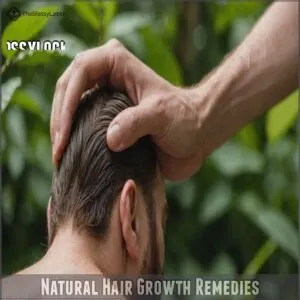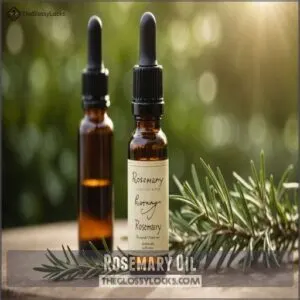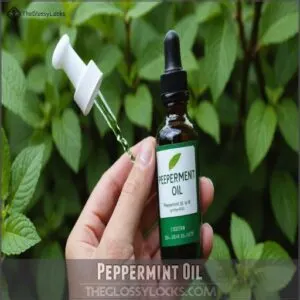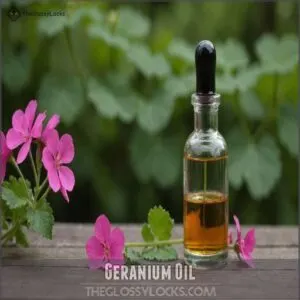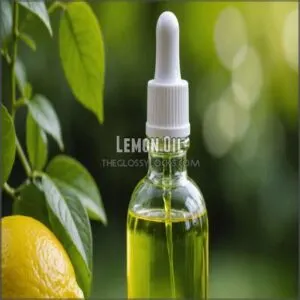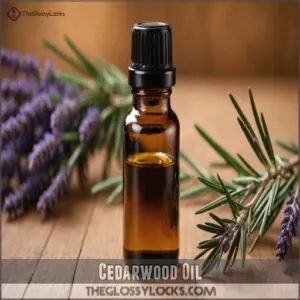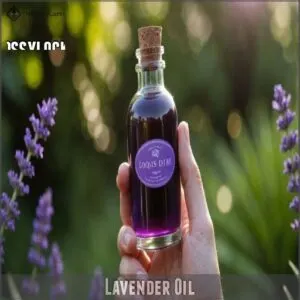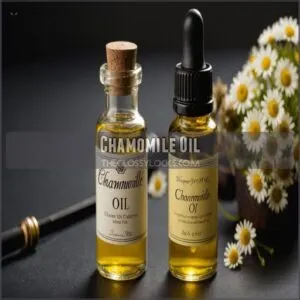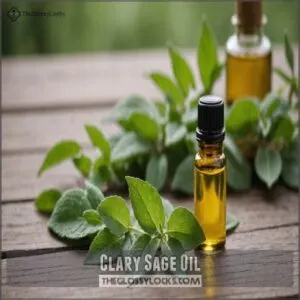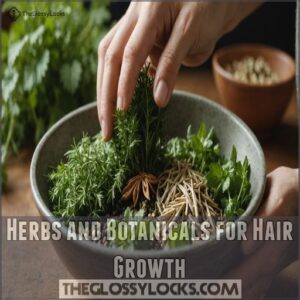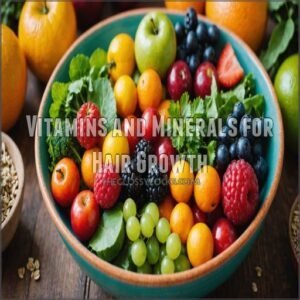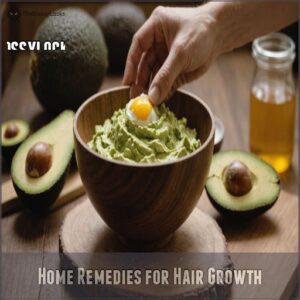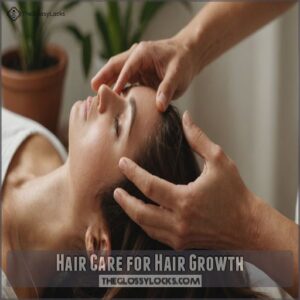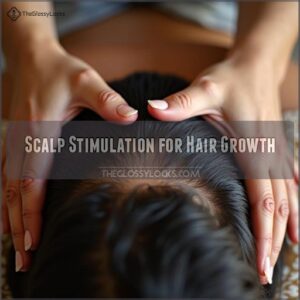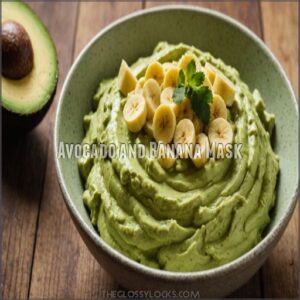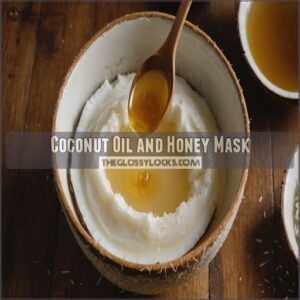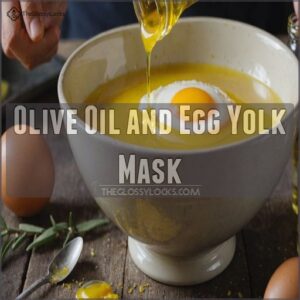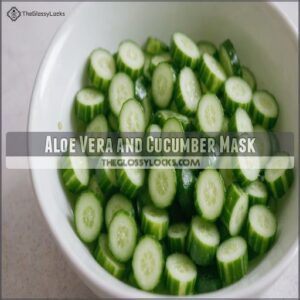This site is supported by our readers. We may earn a commission, at no cost to you, if you purchase through links.
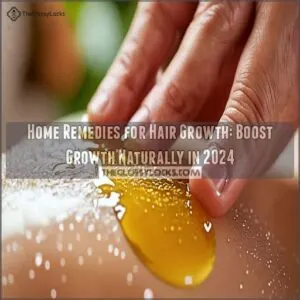 You’ll be amazed at how simple home remedies can boost your hair growth naturally.
You’ll be amazed at how simple home remedies can boost your hair growth naturally.
Start with a daily scalp massage using nutrient-rich oils like coconut or castor oil to stimulate blood flow.
Aloe vera‘s enzymes support a healthy scalp, while onion juice‘s sulfur compounds may enhance follicle strength.
You can also nourish your hair from within by eating protein-rich foods, leafy greens, and omega-3s.
Essential oils like rosemary and peppermint show promising results when diluted and applied regularly.
While there’s no overnight miracle, these science-backed remedies work with your body’s natural growth cycle to support stronger, healthier hair.
Table Of Contents
- Key Takeaways
- Natural Hair Growth Remedies
- Essential Oils for Hair Growth
- Dietary Changes for Hair Growth
- Herbs and Botanicals for Hair Growth
- Vitamins and Minerals for Hair Growth
- Home Remedies for Hair Growth
- Hair Care for Hair Growth
- Scalp Stimulation for Hair Growth
- Natural Hair Masks for Hair Growth
- Frequently Asked Questions (FAQs)
- How can I regrow my hair naturally?
- Are there home remedies for hair loss?
- Can home remedies encourage hair growth?
- How to stimulate hair growth at home?
- What is the best home remedy for hair growth?
- How to grow hair faster naturally?
- What household items make hair grow faster?
- What is the best homemade drink for hair growth?
- Can wearing hats cause permanent hair loss?
- How often should I trim my hair?
- Is swimming in chlorinated pools bad for hair?
- Does sleeping with wet hair damage growth?
- Can certain hairstyles prevent natural hair growth?
- Conclusion
Key Takeaways
- You can boost hair growth naturally with simple techniques like scalp massages, essential oils, and nutrient-rich hair masks using ingredients from your kitchen.
- Your diet plays a crucial role in hair health, so focus on consuming protein-rich foods, omega-3 fatty acids, and vitamins like biotin and iron to support strong, healthy hair growth.
- Gentle hair care practices, such as minimizing heat styling, avoiding tight hairstyles, and using soft hair ties, can prevent damage and promote better growth.
- Consistency is key when using natural remedies for hair growth, as results take time to show. Be patient and persistent with your chosen methods for the best outcomes.
Natural Hair Growth Remedies
When you’re looking to promote hair growth naturally, several remedies might offer some benefits, such as using ingredients like coconut oil, onion juice, and apple cider vinegar in Natural hair growth masks(Natural hair growth masks with kitchen ingredients), based on scientific studies.
Techniques like scalp massage and ingredients such as aloe vera and coconut oil have been shown to potentially enhance hair thickness and health.
Scalp Massage
Scalp massage tools and techniques offer simple, effective hair growth remedies.
By massaging your scalp gently, you boost blood flow, nurturing stronger roots.
Use your fingertips or a soft brush, applying light pressure.
Opt for 4-minute sessions daily to stimulate dermal papilla cells.
Massage oils, like coconut or rosemary, enhance the experience, offering a soothing, stress-relieving routine.
Aloe Vera
Aloe vera’s soothing gel can be your secret weapon in the battle against hair loss.
Packed with enzymes and minerals, it eases dandruff while nurturing your scalp for improved hair growth.
Simply rub the gel directly onto your scalp a few times each week.
- Soothes an itchy scalp
- Reduces dandruff
- Strengthens hair strands
- Promotes hair growth
Coconut Oil
So, you’ve tried aloe vera? Great! Now, let’s talk coconut oil. It’s another popular choice for hair growth.
Many swear by its ability to improve scalp health and hair texture. Coconut oil benefits include moisturizing dry hair and potentially boosting hair growth. You can use it as a pre-wash treatment or a hair mask.
Remember, consistency is key! Give it a few weeks to see if it works for you. Many find it helps with hair loss.
Jojoba Oil
When you’re searching for a natural remedy to boost hair growth, jojoba oil might be your secret weapon.
This versatile oil can help balance your scalp’s natural oils, tackling pesky dandruff and promoting a healthier hair environment.
- Moisturizes the scalp
- Balances oil production
- Reduces dandruff
- Encourages hair growth
Jojoba oil could be your hair’s new best friend!
Castor Oil
Imagine your hair roots as thirsty plants. Castor oil nourishes them deeply, potentially boosting your hair growth, thanks to its rich composition of ricinoleic acid benefits.
Curious about results? People often blend a few drops into a DIY castor oil mask. Just watch out for side effects like a greasy scalp. Dab some on eyelashes too, but measure expectations!
| Benefit | Use | Tip |
|---|---|---|
| Hair Growth | Scalp Massage | Use sparingly |
| Eyelashes | Small Application | Be cautious |
| Moisturization | Overnight Mask | Add to conditioner |
| Results | Patience Needed | Monitor changes |
Onion Juice
Onion juice for hair growth is a home remedy you mightn’t have considered!
Scalp massage techniques for stimulating hair growth, including fingertip massage methods, have been shown to improve blood flow and stimulate hair follicles, Rich in sulfur compounds, it may enhance scalp health and boost hair growth.
To apply, massage fresh onion juice into your scalp and leave it on for about 15 minutes before rinsing.
While scientific evidence is sparse, some folks swear by the improvement in hair growth results.
Garlic
Garlic has made a name for itself in kitchens as well as a hair growth ally.
Packed with sulfur and selenium, it boosts hair health and structure.
Applying a garlic mask or oil might be pungent, but its benefits could overshadow the scent.
Many swear by it for combatting hair loss, making garlic a trusty home remedy.
Hibiscus
Garlic’s strength as a natural remedy wraps up as we shift our gaze to hibiscus, a flowering wonder famous for lush locks.
Whether it’s hibiscus tea, hair oil, or a rejuvenating hair mask, this vibrant bloom gets to work boosting hair growth.
Packed with amino acids, hibiscus fortifies roots, lending shine and strength to your mane effortlessly.
Essential Oils for Hair Growth
Using essential oils like rosemary, peppermint, and lavender could be a natural way to support hair growth.
These oils, often mixed with a carrier oil, are thought to nourish scalp health, though more research is needed to confirm their effectiveness.
Rosemary Oil
Let’s move on to another oil that might help your hair.
Rosemary oil, known for its amazing scent, also boasts potential hair growth benefits.
Studies suggest it may stimulate hair follicles.
You can add a few drops to a carrier oil like coconut oil, then massage it into your scalp.
Remember, consistency is key!
Keep using it regularly to see if it works for you.
It might be your new secret weapon against hair loss.
Rosemary oil for hair growth—worth a try, right?
Peppermint Oil
Consider peppermint oil your secret weapon for hair growth.
Known for its invigorating scent, this oil may enhance scalp health and stimulate hair growth.
Studies suggest its potential in boosting blood flow.
Mix a few drops in a DIY hair mask for a gentle tingling sensation.
Remember, proper oil dilution is key to reaping these benefits safely.
Geranium Oil
Peppermint oil’s tingle might catch your fancy, but have you tried geranium oil for hair growth?
It’s like a secret garden for your scalp!
Studies suggest that geranium oil can help balance the scalp’s natural oils and boost circulation, promoting healthier hair.
Create DIY blends by mixing a few drops with a carrier oil for a revitalizing scalp massage.
Lemon Oil
Lemon oil, a zesty hair care marvel, might give your roots a little boost.
Its antibacterial properties can help keep your scalp healthy, preventing dandruff—a known hair growth saboteur.
To try, mix a few drops into your shampoo or create a DIY lemon oil rinse.
This simple home remedy offers natural benefits, opening doors to luscious locks.
Cedarwood Oil
Cedarwood oil’s benefits for hair growth are backed by some intriguing studies.
This essential oil may improve circulation and balance oil-producing glands in the scalp, possibly promoting hair growth.
A simple DIY blend involves mixing cedarwood oil with a carrier oil like coconut and massaging into your scalp.
It’s a natural remedy that could fit neatly into your hair growth toolbox.
Lavender Oil
Lavender oil, often lauded for its fragrant allure, isn’t just for relaxation.
Castor oil, rich in vitamin E and fatty acids, is one of the key natural oils for hair growth. It’s a gem in home remedies for hair growth.
Studies suggest it may enhance follicle depth and hair count.
Craft DIY lavender oil blends to promote scalp health and combat hair loss.
Try massaging it gently onto your scalp for potentially healthier, fuller hair.
Chamomile Oil
Ever wondered how chamomile oil could boost your hair routine?
Well, it’s not just for tea.
You can find various products that incorporate chamomile oil for hair loss online marketplaces for hair care.
Chamomile oil benefits include soothing the scalp, reducing irritation, and potentially promoting hair growth.
This home remedy is a gentle, natural option for hair care enthusiasts seeking solutions for hair loss, and can be especially effective when used in conjunction with a regular detangling routine to minimize breakage and promote healthy hair growth. This home remedy is a gentle, natural option for hair care enthusiasts seeking solutions for hair loss.
Apply chamomile oil to calm your scalp—it’s like relaxing in a meadow.
Clary Sage Oil
Let’s move on to clary sage oil, another potential ally in your hair growth journey. It’s known for its lovely scent and potential benefits. Some believe it might stimulate hair follicles. However, more research is needed to confirm this.
Here’s what we currently understand:
- Clary sage oil benefits aren’t fully understood.
- It’s used in aromatherapy for relaxation.
- Some claim it improves circulation.
- Always dilute it before applying to your scalp. Proceed with caution.
Dietary Changes for Hair Growth
To support your hair’s growth naturally, consider making some changes to your diet.
Including protein-rich foods, iron, and omega-3 fatty acids in your meals can provide your hair with the necessary nutrients for strength and health.
Protein-Rich Foods
While those essential oils smell heavenly, your hair needs substance.
Protein-rich foods help beef up your strands, offering strength like a growing youth.
Think of a fluffed-up bean burrito or hearty eggs at breakfast.
They’re not just delicious but powerhouses for hair growth.
Balance your plate, and your hair’s bound to thrive.
| Protein Source | Benefit |
|---|---|
| Eggs | Versatile |
| Beans | Plant-based |
| Nuts | Nutrient-dense |
Iron-Rich Foods
You’ve looked at protein-rich foods, now think about iron-rich foods for hair growth.
Iron keeps your hair strong and full.
From clams and spinach to pumpkin seeds, these are your go-tos.
Vegetarians, remember to boost absorption by pairing iron with vitamin C.
Iron deficiency can be sneaky, leading to hair troubles, so these foods help keep your locks lush.
Foods High in Omega-3 Fatty Acids
Iron boosting your hair? It needs a friend—omega-3 fatty acids, which also provide protein, B vitamins, vitamin D, zinc, and vitamin E, all important for hair health benefits.
These good fats are like a cozy blanket for your hair, keeping it shiny and strong.
You’ll find them in fatty fish like salmon, or if you’re steering clear of fish, walnuts and flaxseeds have your back.
Supplements can help too, adding yet another layer to your hair health strategy.
Foods Rich in Vitamins and Minerals
Omega-3s laid the groundwork for healthy hair, but vitamins and minerals seal the deal.
Load your plate with spinach, rich in iron and vitamin A, alongside zinc-packed pumpkin seeds.
Don’t overlook biotin from eggs or vitamin C from citrus fruits.
Certain vitamins and minerals, including those that address nutritional deficiencies and hair growth, significantly contribute to healthy hair follicles and overall well-being. These nutrients boost hair growth and help prevent loss by supporting follicle health and nutrient absorption.
Foods That Promote Healthy Hair Growth
To boost healthy hair growth, your diet needs some focus.
Think of meals as your hair’s secret handshake.
Make sure you’re feeding those follicles with these power-packed options:
- Protein sources like lean meats, eggs, and legumes fuel hair strength.
- Iron-rich foods such as spinach and lentils ward off hair fall.
- Omega-3 foods like salmon and chia seeds keep hair shiny.
Herbs and Botanicals for Hair Growth
Many herbs and botanicals, like ginseng and stinging nettle, show promise in boosting hair growth, though more research is needed to confirm their effectiveness.
You can explore options such as incorporating these into your routine, but always remember to consult a healthcare professional before starting any new supplement regimen.
Red Ginseng
Red ginseng packs a punch in terms of tackling hair loss.
It’s known for stimulating hair growth, thanks to its ability to boost blood circulation.
Think of it as a traffic cop keeping things moving smoothly.
Here’s a quick guide:
| Aspect | Details |
|---|---|
| Benefits | Stimulates growth, improves circulation. |
| Dosage | Follow product instructions or doctor advice. |
| Side Effects | Rare; consult if unsure. |
| Supplements | Available in capsules or powders. |
Tulsi
Tulsi, often called "Holy Basil," could be your secret weapon against hair loss. It might promote hair growth by stimulating blood flow to your scalp. Its natural properties can combat dandruff and strengthen hair roots.
- Experience a richer scalp with Tulsi tea rinses.
- Enjoy its grounding aroma while using Tulsi-infused oils.
- Harness Tulsi’s ancient healing powers for vibrant hair.
Stinging Nettle
Stinging nettle steps up as a champion in herbal hair growth remedies.
Loaded with vitamins A, C, and minerals, nettle supports hair health and reduces hair loss.
Whether sipping nettle tea or trying supplements, it enriches the scalp, potentially boosting hair growth.
Beware, though—stinging nettle may have side effects, so consult your doctor before diving in.
Saw Palmetto
Saw palmetto often makes waves in the hair growth scene due to its potential benefits.
Known for supporting prostate health, it’s also eyed as a hair loss remedy.
While some folks swear by it, remember that herbal supplements can have side effects.
Always check the dosage and chat with a healthcare professional before diving into these natural hair growth remedies.
Beta-sitosterol
Embrace the power of beta-sitosterol, a plant-based compound believed to aid in hair growth.
Found in nuts and seeds, it can be a natural addition to your hair loss remedies.
Interested in supplements? Start with a doctor-approved dosage.
While this natural remedy offers potential benefits, it’s wise to think about side effects.
Explore and see if it works for you!
Vitamins and Minerals for Hair Growth
You might already know that vitamins and minerals play a vital role in maintaining healthy hair growth.
By including nutrients like biotin, iron, and vitamin D in your diet, you can support your hair’s natural growth cycle effectively.
Biotin
You’ve probably heard of biotin, a B vitamin important for healthy hair.
Biotin deficiency can lead to hair loss, so boosting your intake might help.
Biotin supplements are readily available, but consult your doctor before starting any new regimen.
Good biotin sources include eggs, nuts, and sweet potatoes.
While biotin benefits are touted, more research is needed to confirm its impact on hair growth.
Don’t expect miracles overnight, but it’s worth considering as part of a healthy hair care plan.
Folic Acid
Folic acid, a B-vitamin superhero, usually gets the spotlight during pregnancy, helping to combat hair loss.
But don’t overlook its role in promoting hair growth for everyone!
Found in leafy greens and citrus fruits, it works wonders as part of hair growth supplements.
So, sprinkle folic acid foods into your diet and let this powerhouse boost your hair growth naturally.
Vitamin C
Imagine your hair’s secret weapon hidden in an orange.
Vitamin C isn’t just for winter colds; it’s a powerhouse for hair growth.
You can also find Vitamin C hair growth products like Vitamin C hair oil to support your hair care routine.
As a trusty sidekick, it boosts collagen production, ensuring your hair’s structure stays strong.
With citrus fruits, you’re packing a punch of antioxidant power, making Vitamin C a star player in hair growth vitamins.
Vitamin E
Vitamin E isn’t just great for your skin; it’s also a superstar for your hair.
This powerful antioxidant helps fight off free radicals that can damage your locks.
You’ll find it in foods like nuts, seeds, and leafy greens.
Some folks swear by vitamin E oil applied directly to their scalp, claiming it boosts circulation and promotes healthier hair growth.
While more research is needed, it’s certainly worth a try!
Iron
Iron deficiency can put the brakes on your hair growth journey.
Your body needs iron to produce hemoglobin, which carries oxygen to your hair follicles.
If you’re running low, your locks might suffer.
Boost your iron intake with foods like lean meats, lentils, and spinach.
Can’t stomach spinach? No worries – a chat with your doc about iron supplements might be your ticket to luscious locks.
Selenium
Ever wondered if your diet might be missing a key hair growth ingredient?
Selenium, a trace mineral, plays a key role in keeping your locks healthy.
A deficiency could lead to hair loss, so it’s worth checking your intake.
You can boost your selenium levels through foods like Brazil nuts, tuna, and whole grains.
If you’re considering supplements, talk to your doctor first to make sure you’re on the right track.
Zinc
For healthy hair growth, zinc plays a vital role.
This mineral supports protein synthesis and cell division, essential for hair follicle health.
Here’s why zinc matters:
- Helps repair and grow hair tissue
- Keeps oil glands around follicles working properly
- Protects against hair loss and breakage
- Aids in protein absorption, a key building block for hair
If you’re not getting enough zinc, your locks might suffer.
Consider adding zinc-rich foods or talking to your doc about supplements.
Vitamin D
Boosting your vitamin D levels might be the key to promoting healthier hair growth.
This sunshine vitamin plays a vital role in creating new hair follicles.
If you’re not soaking up enough rays, consider vitamin D-rich foods like fatty fish or fortified milk.
Supplements can help too, but chat with your doc first.
Remember, balance is key – too much D can be as harmful as too little.
Home Remedies for Hair Growth
You’ll find a treasure trove of natural hair growth remedies right in your kitchen.
From egg yolk masks to fenugreek seeds, these time-tested solutions might give your locks the boost they need.
Without breaking the bank.
Egg Yolk Mask
Packed with proteins and nutrients, egg yolk masks can work wonders for your hair.
Mix an egg yolk with a tablespoon of olive oil and honey, then apply to damp hair.
Leave it on for 20 minutes before rinsing.
This DIY treatment nourishes your scalp, promotes shine, and may boost hair growth.
Try it once a week for best results, but don’t overdo it—too much protein can make hair brittle.
Henna
Henna isn’t just for creating beautiful designs on your skin.
This natural dye can also work wonders for your hair.
Here’s why you might want to give henna a try:
- Adds a gorgeous reddish tint to your locks
- Conditions and strengthens hair strands
- May promote hair growth by nourishing the scalp
- Creates a protective layer around each hair shaft
Remember, henna results can vary, so do a strand test first!
Fenugreek
Fenugreek’s got a trick up its sleeve for your locks.
These little seeds pack a punch in terms of hair growth.
Soak ’em overnight, grind ’em up, and mix with coconut oil for a DIY hair mask.
Leave it on for 30 minutes before washing.
The result? Stronger, shinier hair that might just grow a bit faster.
Give it a shot – your mane will thank you!
Amla (Indian Gooseberry)
Amla, also known as Indian gooseberry, is a powerhouse for hair health.
This vitamin C-rich fruit can help strengthen your hair follicles and promote growth by tackling scalp infections, similar to how thyme oil helps.
You can use amla oil, powder, or tea to reap its benefits.
Try massaging amla oil into your scalp or mixing amla powder with water for a DIY hair mask.
It’s even known to combat dandruff and premature graying.
Rosemary Essential Oil
Looking for a hair growth boost?
Rosemary essential oil might be your new best friend.
This fragrant oil has been shown to improve circulation and stimulate hair follicles.
You can easily find high-quality rosemary essential oil products online at Rosemary oil shops.
Mix a few drops with a carrier oil like coconut or jojoba, then massage it into your scalp.
Use it twice weekly for best results.
Remember, consistency is crucial for natural remedies!
Hair Care for Hair Growth
You can nurture your hair’s growth potential through gentle, mindful care. By avoiding harsh treatments and minimizing mechanical stress, you’ll create a favorable environment for your locks to thrive.
Avoid Hair Accessories That Cause Breakage
Your hair accessories might be sabotaging your growth goals.
Those tight ponytails and rubber bands you love? They’re actually damaging your strands.
Switch to soft scrunchies or coiled hair ties to prevent breakage.
When using clips, opt for ones with smooth edges and avoid metal clasps.
At night, trade your usual elastic for a silk scrunchie or loose braid to protect your hair while you sleep.
Minimize Bleach, Relaxers, and Hair Dye
Chemical treatments can take a toll on your hair’s health, slowing growth and causing breakage.
While that fresh color might boost confidence, frequent bleaching or relaxing weakens hair strands from the inside out.
Consider switching to natural alternatives like henna or temporary colors.
If you must dye, space out treatments by at least six weeks and always use deep conditioning treatments to minimize damage.
Avoid Excess Shampooing or Brushing
Washing and brushing habits can make or break your hair health journey.
While chemical treatments take a toll, daily shampooing strips natural oils that protect your scalp and strands.
Instead, space out wash days to 2-3 times weekly, allowing beneficial oils to nourish your hair.
- Skip the morning rush hair-yanking sessions that leave your scalp screaming
- Say goodbye to that squeaky-clean feeling that’s secretly damaging your hair
- Embrace your hair’s natural oils – they’re nature’s conditioning treatment
- Let your scalp breathe between washes, just like it’s meant to
Treat Hair Gently to Preserve and Minimize Loss
Gentle hair care habits make a big difference in preserving length and minimizing breakage.
Skip tight ponytails and opt for loose braids or silk scrunchies.
When drying, pat your hair with a microfiber towel instead of rough rubbing.
Use a wide-tooth comb to detangle wet hair, starting from the ends and working up.
Heat styling? Always use a protective spray and keep the temperature moderate.
Scalp Stimulation for Hair Growth
You’ll be amazed how a simple scalp massage can boost your hair growth, as studies show just 4 minutes of daily stimulation increases hair thickness.
Whether you use your fingertips or a massage device, you’re helping to improve blood flow to your hair follicles, which research suggests can lead to better growth.
Scalp Massage Device
A scalp massage device can take your hair care routine to the next level.
Studies show that mechanical stimulation for 4 minutes daily boosts blood flow and potentially increases hair thickness.
You’ll find various options, from waterproof silicone massagers to electric devices with multiple settings.
They’re especially effective when paired with hair oils.
Look for devices with soft, flexible tips that won’t tangle your hair.
Scalp Brushes
A high-quality scalp brush can transform your hair care routine by stimulating blood flow and distributing natural oils.
Using a scalp brush with gentle bristles can also help reduce shedding and improve hair health, especially when used with dandruff-fighting products.
This simple tool works wonders for both your scalp health and hair growth potential.
Here’s what you need to know about scalp brushes:
- Choose silicone or natural boar bristles for gentle exfoliation
- Look for antimicrobial materials to prevent bacterial growth
- Consider brush size based on hair thickness
- Replace your brush every 6-8 months for best hygiene
Massaging Techniques
Deep-tissue scalp massage techniques can transform your hair growth journey when done correctly.
You’ll want to use your fingertips (not nails) to apply firm, circular motions across your scalp.
| Technique | Pressure Level | Benefits |
|---|---|---|
| Circular Motion | Medium | Increases blood flow |
| Kneading | Firm | Releases tension |
| Tapping | Light | Stimulates follicles |
| Zigzag | Medium | Distributes oils |
Apply these techniques for 4-5 minutes daily before bed.
Natural Hair Masks for Hair Growth
You’ll find that natural hair masks combine potent ingredients like avocado, coconut oil, and egg yolks to nourish your scalp and strengthen hair follicles.
These nutrient-rich mixtures work together to create the ideal environment for healthy hair growth, while also protecting your existing strands from damage.
Avocado and Banana Mask
With potassium-rich bananas and vitamin E-packed avocados, this mask nourishes your hair from root to tip.
Mash half a ripe avocado with one banana, apply to damp hair, and let it sit for 20 minutes.
The natural oils and vitamins penetrate your strands, promoting strength and shine.
Plus, this duo’s creamy texture makes application a breeze – it’s like giving your hair a smoothie treatment!
Coconut Oil and Honey Mask
A powerhouse hair-growth combo awaits in your kitchen: coconut oil and honey.
Mix 3 tablespoons of virgin coconut oil with 2 tablespoons of raw honey, warm it slightly, and massage into your scalp and hair.
The antimicrobial properties of honey combined with coconut oil’s deep-penetrating nutrients create an effective treatment.
Leave it on for 30 minutes before washing with a gentle shampoo.
Olive Oil and Egg Yolk Mask
Combining olive oil and egg yolk creates a powerful hair mask packed with proteins and healthy fats.
Mix one egg yolk with two tablespoons of olive oil, apply to damp hair, and let it sit for 20 minutes.
You’ll notice softer, shinier hair after the first use.
For best results, use this mask weekly – it’s like giving your hair a nutritious breakfast that’ll keep it growing strong.
Aloe Vera and Cucumber Mask
A cooling aloe vera and cucumber mask can work wonders for your hair growth journey.
You’ll need fresh aloe vera gel and blended cucumber – both packed with vitamins and minerals that nourish your scalp.
Mix equal parts, apply to your scalp and hair, then let it sit for 30 minutes before rinsing.
Use this mask twice weekly for best results in promoting healthy hair growth.
Frequently Asked Questions (FAQs)
How can I regrow my hair naturally?
Massage your scalp daily with coconut or rosemary oil, take protein-rich foods, and try aloe vera treatments.
You’ll also benefit from vitamin B5 benefits for hair growth, which can improve shine and reduce breakage through hair moisturizing properties, and gentle hair care and scalp exercises.
These natural methods support healthy hair growth.
Are there home remedies for hair loss?
You’ll find several effective home remedies for hair loss: scalp massage with coconut oil, aloe vera gel application, onion juice treatments, and rosemary oil blends.
Try protein-rich foods and daily scalp exercises too.
Can home remedies encourage hair growth?
Several natural remedies can promote hair growth, including scalp massage with coconut oil, applying aloe vera, and using onion juice.
Regular use of rosemary oil and maintaining a protein-rich diet also shows promising results.
How to stimulate hair growth at home?
Regular scalp massages with coconut or rosemary oil can boost circulation and growth.
Scalp massages can help stimulate hair growth.
You can also try aloe vera treatments, protein-rich masks, and gentle scalp exercises while maintaining a nutrient-rich diet.
What is the best home remedy for hair growth?
Massage your scalp with coconut oil mixed with rosemary essential oil for 4 minutes daily.
This combination stimulates blood flow and provides nutrients to hair follicles, potentially promoting natural growth and thickness.
How to grow hair faster naturally?
You’ll be amazed how quickly your hair can grow!
Boost growth naturally by eating protein-rich foods, applying coconut oil, massaging your scalp daily, and using rosemary oil.
Don’t forget to manage stress levels.
What household items make hair grow faster?
Try these kitchen staples for faster hair growth: eggs (protein boost), olive oil (nourishing), avocado (vitamin E), and coconut oil (scalp health).
Massage them into your scalp weekly.
Remember, patience is key – results take time.
What is the best homemade drink for hair growth?
Sip your way to luscious locks!
The best homemade drink for hair growth is a blend of aloe vera juice, coconut water, and spinach.
It’s packed with vitamins and minerals that nourish your scalp from within.
Can wearing hats cause permanent hair loss?
Wearing hats doesn’t directly cause permanent hair loss.
However, tight headwear can lead to traction alopecia if worn excessively.
To protect your locks, opt for looser-fitting hats and give your scalp regular breathing room.
How often should I trim my hair?
You should trim your hair every 6-8 weeks.
Regular trims help prevent split ends and breakage, promoting healthier growth.
If you’re growing your hair out, you can stretch it to 3-4 months between cuts.
Is swimming in chlorinated pools bad for hair?
Swimming in chlorinated pools can dry out your hair and scalp.
The chlorine strips natural oils, potentially causing damage.
To protect your locks, wet your hair with fresh water before swimming and use a swim cap when possible.
Does sleeping with wet hair damage growth?
Like a damp towel left on wood, sleeping with wet hair can weaken your strands.
It may not directly damage growth, but it can lead to breakage and frizz.
Try to dry your hair before hitting the pillow.
Can certain hairstyles prevent natural hair growth?
Certain hairstyles can indeed hinder natural hair growth.
Tight ponytails, braids, or buns put excessive tension on your hair follicles, potentially leading to traction alopecia.
Opt for looser styles to keep your locks healthy and growing strong.
Conclusion
Picture your hair: lush and vibrant, or thin and lackluster?
The path to healthier locks isn’t always paved with expensive products.
Home remedies for hair growth offer natural, budget-friendly options to nurture your scalp and strands.
From scalp massages to nutrient-rich masks, you’ve got a toolkit of techniques at your fingertips.
Remember, consistency is key.
While results won’t happen overnight, patience and persistence can lead to noticeable improvements.
So why not give these natural methods a try?
Your future self (and your hair) might thank you.

